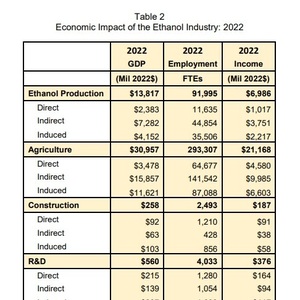RFA: Ethanol's impact on the US economy strengthened in 2022

February 28, 2023
BY Renewable Fuels Association
The ethanol industry’s contribution to the U.S. economy increased in 2022 as production volumes continued to recover from COVID pandemic levels and producers received higher prices for ethanol and co-products like distiller grains and corn oil, according to an analysis conducted for the Renewable Fuels Association by ABF Economics.
In 2022, more than 78,800 U.S. jobs were directly associated with the ethanol industry, with an additional 342,800 indirect and induced jobs supported across all sectors of the economy. The industry created $34.8 billion in household income and contributed just over $57 billion to the nation’s gross domestic product—the second-highest GDP contribution ever. The jobs, GDP, and household income values exhibited significant increases from 2021 levels.
Advertisement
“The U.S. ethanol industry continues to make a vital contribution to the nation’s economic well-being,” said RFA President and CEO Geoff Cooper. “Last year, as our country battled historic inflation and economic uncertainty, the industry supported more than 400,000 good-paying jobs and spurred reinvestment in rural communities across the country. And as gas prices hit record highs in 2022, ethanol producers increased their output of lower-cost, lower-carbon renewable fuel to help deliver economic relief to consumers around the world.”
The 2022 report also shows that the industry spent nearly $47 billion on raw materials, other inputs, and goods and services to produce ethanol last year, with corn purchases alone accounting for more than $38 billion. The report also provides a breakdown of economic impacts and jobs supported by the ethanol industry in major ethanol-producing states in 2022.
Advertisement
“The ethanol industry continued to make a significant contribution to the economy in terms of GDP, job creation, generation of tax revenue, and displacement of crude oil and petroleum products in 2022,” the report concluded. “The importance of the ethanol industry to agriculture and rural economies is particularly notable. Growth and expansion of the ethanol industry as it applies new technologies and addresses new markets will enhance the industry’s position as the original creator of green jobs and will enable America to make further strides toward reducing greenhouse gas emissions and positively dealing with climate change.”
Related Stories
The USDA significantly increased its estimate for 2025-’26 soybean oil use in biofuel production in its latest World Agricultural Supply and Demand Estimates report, released July 11. The outlook for soybean production was revised down.
The U.S. Energy Information Administration maintained its forecast for 2025 and 2026 biodiesel, renewable diesel and sustainable aviation fuel (SAF) production in its latest Short-Term Energy Outlook, released July 8.
XCF Global Inc. on July 10 shared its strategic plan to invest close to $1 billion in developing a network of SAF production facilities, expanding its U.S. footprint, and advancing its international growth strategy.
U.S. fuel ethanol capacity fell slightly in April, while biodiesel and renewable diesel capacity held steady, according to data released by the U.S. EIA on June 30. Feedstock consumption was down when compared to the previous month.
XCF Global Inc. on July 8 provided a production update on its flagship New Rise Reno facility, underscoring that the plant has successfully produced SAF, renewable diesel, and renewable naphtha during its initial ramp-up.
Upcoming Events










